
Access to information is
part of freedom of expression, together with an active citizenry, and
thus one of the preconditions for ensuring a vibrant and well-informed
democracy. NGOs demand of the governments to respect and comply with
their obligations following national and international standards.
First
Baltic Sea NGO Forum 2001
Baltic Sea NGO Forum
Submission for the Sixteenth Session
of the Working Group on the Universal Periodic Review: Germany
 in
German on same subject: http://wkeim.bplaced.net/files/if-dimr-pbt.htm
in
German on same subject: http://wkeim.bplaced.net/files/if-dimr-pbt.htm
Walter Keim, participant
of the Baltic Sea NGO
Forum
Torshaugv. 2 C
N-7020 Trondheim, 18.
September
2012
OHCHR Civil Society Section (e-mail
submission to uprsubmissions@ohchr.org only)
United Nations Office
8-14 avenue de la Paix
CH-1211 Geneva 10
Switzerland
Copy: Baltic
Sea NGO Forum, German Foreign Ministry
(Auswärtiges Amt: Menschenrechtsbeauftragter), German
Institute for Human Rights
UPR Submission
Session 16 (25. April 2013): Five states in Germany violate the
human right of access to public documents (Article 19 CCPR)
Contents:
- Access to public documents is a human right according to Article 19
CCPR
- 5 states in Germany violate the human right of access to public
documents found for 5.9 billion i. e. 84 % of the worlds population
- The rank of CCPR as a law is de
facto not respected
- Recommendations:
- Germany has to adopt access to informations (ATI) laws in all 16
federal states and improve federal ATI law to meet international
standards
- Withdraw reservation on Article 19 of CCPR
- The rank of CCPR in German law must be respected and should be
improved.
- The recommendations of the Human Rights Commissioner
of the Council of Europe, e. g. educate administration and judges in
international law i. e. CCPR should be done.
- Judges should not be hired, promoted and supervised
by the executive power i. e. Resolution
1685
(2009) and Recommendation
No.
R
(94)12 of the Council of Europe should be followed.
- CCPR, International Covenant on Economic, Social and Cultural
Rights and the European Convention of Human Rights should be
included in the Internet collection of the "laws of Germany" (www.Gesetze-im-Internet.de
and http://bundesrecht.juris.de).
- The German Institute of Human Rights should monitor human rights in
Germany according to Paris principals.
- Defamation should be decriminalized.
X. Baltic Sea NGO Forum 2012, in WS III Human Rights: Freedom of information
recommended in the Final
Statement (15,
16) that
the Baltic Sea NGO Network oversee the implementation of the Universal
Periodic Review (UPR) process in each country of all the Council of Baltic
Sea States (CBSS) member states. The UPR
process oversees all human right conventions. The deadline for other
stakeholders is 2.
October 2012 for the 16th UPR Working Group session (22
April to 3 May 2013).
I refer to the 6. state report of Germany according to Article 40 of
the International Covenant on Civil and Political Rights (CCPR), reporting
to the Human Rights Committee dated 18 April 2010 (1).
The Human Rights Committee will consider the CCPR report of Germany and
country situation during the session the 106th
session (15 October - 2 November 2012) in Geneva. The EU Fundamental
Rights Agency suggested to contact the Council of Europe
and the German Human Rights Institute (2),
answering a complaint on lack of Freedom of information in Germany (3).
The GRECO (Group of States against corruption) did not observe that access
to informations laws are missing in 5 states in Germany (N).
The German Human Rights Institute did not answer the suggestion
to complain about the lack of access to information in 5 German lander.
The X. Baltic Sea NGO Forum 2012 asked me to investigate "The
role of international lawmakers and their respective influence on national
legislation on access to information." The result was that all states
of the Council of Baltic Sea States followed the advice of the first Baltic
Sea NGO Forum with respect to international standards for access to
information with the exception of Germany.
1. Access to public documents is a human right according to Article 19
CCPR
Freedom of Information (including access to public documents) is part of Article 19 the International Covenant on Civil
and Political Rights (ICCPR), which Germany has
signed.
The UN Special Rapporteur on the promotion and protection
of the right to freedom of opinion and expression reported e. g. in E/CN.4/1998/40,
28 January 1998 and E/CN.4/2000/63,
18 January 2000 and A/HRC/14/23,
20 April 2010 that
access to public documents is a human right.
UN, OSCE and AOS confirmed in Joint Declaration of 6.
December 2004, that access to information is a human right: (4):
"The right to access information held by public authorities is a
fundamental human right which should be given effect at the national
level through comprehensive legislation (for example Freedom of
Information Acts) based on the principle
of maximum disclosure, establishing a presumption that all
information is accessible subject only to a narrow system of
exceptions."
The "General Comment No. 34 on Article 19 of the ICCPR" confirms
this (5):
"18. Article 19,
paragraph 2 embraces a general right of access to information held by
public bodies. Such information includes all records held by a public
body, regardless of the form in which the information is stored, its
source and the date of production."
"19.(...) States parties should also enact the necessary procedures,
whereby one may gain access to information, such as by means of freedom
of information legislation."
Germany tried to remove the human right of access to public documents and
other human rights (13)
from the Draft
General
Comment No. 34 on Article 19 ICCPR (see page 17 reference
14). Decriminalization of defamation and abolition of prison sentences
(Article 49) is objected. Access to public documents is not considered a
fundamental right according to the German Basic Law. The ICCPR has only the
rank of a law. Therefore it is suggested to remove access to public
documents from the ICCPR.
2. Five states (Länder) violate the human right of access to public
documents
I have informed the states Hesse, Lower
Saxony, Saxony,
Bavaria
and Baden-Württemberg
several times about the human right access to public documents. However
these 5 states with half of the German population continue to violate this
human right and general access laws are not given (6).
Access to public documents is only possible for environmental and consumer
information.
The NGO "Bündnis für Informationsfreiheit in Bayern" has collected many
examples of denial of access (10).
Refererence
7 gives additional examples of denial of access to public documents.
The UN Convention against Corruption of 14. December 2005 has been
ratified by more than 159 states with 6.5 billion inhabitants.
However Germany
could not ratify because bribery of members of parliament is not a
criminal act. This law would have to be given by parliamentarians
itself.
The Group
of States against Corruption
(GRECO) of the Council of Europe saw
deficiencies combating corruption in Germany and made 2009
suggestions on transparency of financing of parties (K).
The federal parliament Bundestag refused 2011 (see "Ausschussdrucksache
17(4)283 des Innenausschusses") to comment these suggestions with the
majority of the governing coalition parties of CDU/CSU and FDP (M).
Germany's answer 29. June 2012 shows that no progress has been
made (N).
More then 120 states
with 5.9
billion i. e. 84 % of the world population adopted either FOI laws
or constitutional provisions (I).
Citizens in 5 states in Germany with more then half of the population
lack this human right.
84 states with 5.5
billion i. e. 78 % of the world population give better access to
information then the federal Freedom of Information Law in Germany (http://www.rti-rating.org/country-data/).
International standards e. g. principle of maximum disclosure, reasonable
costs are the basis of this investigation.
3. The rank of the ICCPR is not respected in praxis
Paragraph 118 of the State report reads: "CCPR is part of German justice
system as federal law. Therefore it is binding for federal states." But this
is not respected by German administration and courts.
Therefore German courts may decide against human rights if there is a
conflict, e. g. the highest Court in the German land Rhineland-Palatinate
LG Mainz (1 QS 25/98) stated that the court can not give access
to documents (as the European Convention of Human Rights would demand),
because it is the parliament, which would have to give this right. This
court expresses here that they are not allowed to do what human rights would
say.
Internet pages "laws in Internet" (www.Gesetze-im-Internet.de
and http://bundesrecht.juris.de)
do not contain the CCPR. Therefore I have 28.
April 2007 suggested to add it together with other human rights
covenants. The answer 14. July 2007 says
that the capacity was not big enough. It is difficult to believe that
this a valid reason.
Court cases Walter
Keim ./. Germany
VG 2 A 85.04 and VG
2 A 55.07 show that the Administrative Court of Berlin
(Verwaltungsgericht Berlin), and the Higher Administrative Court
(Oberwaltungsgericht) and later the Constitutional Court (Verfassungsgericht)
in cases 1 BvR 1981/05, 1
BvR 2565/05 and 1
BvR 238/09 that the human rights character of access to public
documents of the CCPR is ignored (7).
Many applications referring to the CCPR are denied without even discussion.
This proves that the rank of CCPR being a law is ignored (7).
The ICCPR human right access to public documents is rejected by the German
government, because it is considered no fundamental right of the German
Basic law (constitution) (13).
The reservation on Article 19 CCPR restricts foreigners rights in Germany.
The federal law of Freedom of Information has too many exceptions and
violates international principle of maximum disclosure. Comparison with
laws from 111 other countries places Germany
on 105th rank, 5.5 billion people i. e. 78 % of the
worlds population have better access laws (J).
[Bring the Access to Information Act in line with international standards,
and recognize a freestanding constitutional right to information.]
4. Recommendations
The Report of the Human Rights Commissioner of the Council of
Europe 2006 suggests to educate administration and judges in human
rights e. g. CCPR (8). Unfortunately both the federal and local parliaments refused
to consider this proposition (9).
In federal states judges at administrative courts are hired, promoted
and supervised by the executive power and are not independent according
to Article 14 CCPR. In the federation the influence of the executive
power is somehow less, but still too much (11).
In approx. 50 States access to public documents is found in the
constitution. Approx. 90
states have adopted access to information laws. In Europe basically
Belarus and 5 German states are missing. After India in 2005, China in
2008, Russia in 2010 and Brazil in 2011 (BRIC countries) adopt laws on
access to information only some countries in Africa and the Middle East
are missing.
Germany's report should have been given 1.
April.2009. The report was registered 18. April 2011 at UN.
In many states – e. g. for the European Convention of Human Rights -
international conventions have a higher rank compared to laws e. g.
Austria, Switzerland and Norway (12).
The Human Rights Commissioner of the Council of Europe suggested to give
the German Human Rights Institute the task to monitor human rights in
Germany (F).
The independence of the Institute should be strengthened according to
Paris principals.
General comment No. 34 Article 19: Freedoms of opinion and expression §
47 states: "States parties should consider the decriminalization of
defamation and, in any case, the application of the criminal law
should only be countenanced in the most serious of cases and imprisonment
is never an appropriate penalty." Imprisonment according to Chapter
14, Section 185 Insult, Section 186, 187, 188 Defamation of the German
Criminal Code should be removed.
Recommendations summarized:
- Germany has to adopt access to informations (ATI) laws in all 16
federal states and improve federal ATI law to meet international
standards
- Withdraw reservation on Article 19 of CCPR
- The rank of CCPR in German law must be respected and should be
improved.
- The recommendations of the Human Rights Commissioner
of the Council of Europe, e. g. educate administration and judges in
international law i. e. CCPR should be done.
- Judges should not be hired, promoted and supervised
by the executive power i. e. Resolution
1685
(2009) and Recommendation
No.
R
(94)12 of the Council of Europe should be followed.
- CCPR, International Covenant on Economic, Social and Cultural
Rights and the European Convention of Human Rights should be
included in the Internet collection of the "laws of Germany" (www.Gesetze-im-Internet.de
and http://bundesrecht.juris.de).
- The German Institute of Human Rights should monitor human rights in
Germany according to Paris principals.
- Defamation should be decriminalized.
Yours sincerely,
Walter Keim
Copy: Human
Right Commissioner of the CoE, Fundamental
Rights
Agency, Ausschuss
für Menschenrechte und Humanitäre Hilfe, German Institute for Human
Rights, OSCE
References:
- 6. state report submitted by Germany under article 40
of the Covenant CCPR: http://www.ccprcentre.org/doc/HRC/Germany/CCPR_C_DEU_6_en.doc
- 26.03.2007: German Human Rights Institute is
responsible for human rights in Germany: http://wkeim.bplaced.net/files/eu-hra-070329.pdf
- 01.03.2006: Access to Information and other Violations
of Human Rights in Germany : http://wkeim.bplaced.net/files/eu-hra-complaint.htm
- 2004 International Mechanisms for Promoting Freedom of
Expression: JOINT DECLARATION http://merlin.obs.coe.int/iris/2005/2/article1
- General
Comment
No. 34 on article 19 by the Human Rights Committee: http://www2.ohchr.org/english/bodies/hrc/comments.htm
- 5 federal states (lander) ignore the human right
of access to public documents: http://wkeim.bplaced.net/files/ifg-5-laender-en.htm
- Administration and jurisprudence about freedom of
information: http://wkeim.bplaced.net/files/ifg-material.htm
- Petition realisation of the suggestions of the Human
Right Commissioner of the CoE: http://wkeim.bplaced.net/petition_gg.htm
- Rejection of the suggestions of the Human Right Commissioner of the
CoE by parliament Bundestag and 8 länderparliaments: http://wkeim.bplaced.net/coe_resultat.htm#antworten
- Bündnis für Informationsfreiheit in Bayern: (In)transparenz in Bayern:
http://www.informationsfreiheit.org/3964.html
- Separation of powers in Europe: http://wkeim.bplaced.net/files/separation_of_powers.htm
- Geiger, Grundgesetz und Völkerrecht, 5. Auflage, S. 160; Schweisfurth,
Völkerrecht, S. 202; Nowak, CCPR-Commentary, Second editition, Art. 2,
Rn. 55
- 11. February 2011:
Germany asked to remove the human right of access to public documents
and other human rights: http://wkeim.bplaced.net/files/German_comments_on_Draft_General_Comment_No.34.pdf
- HUMAN RIGHTS COMMITTEE. DISCUSSIONS ON DRAFT GENERAL COMMENT NO. 34-
MEETING NOTES (18 MARCH – 24 MARCH 2011): http://freedominfo.org/documents/HRCnotesMarch2011.pdf
- X. Baltic Sea NGO Forum, Final Statement, WS III: Human rights: http://www.bsngoforum.org/files/Final_statement.pdf
- We urge the CBSS to create an Ombudsman for Human Rights.
- In each country of the Baltic Sea Region, there shall be installed
independent national Human Rights Institutes according to the Paris
principles.
- The workshop recommends that the Baltic Sea NGO Network oversee
the implementation of the Universal Periodic Review (UPR) process in
each country of all the CBSS member states.
- X. Baltic Sea NGO Forum: The
role of international lawmakers and their respective influence on
national legislation on access to information: http://wkeim.bplaced.net/files/ATI-BSNF.htm
- There are 269
hits (Accessed January 2013) on "Access to Information" in the UPR-Info.org
database e. g. freedom
of information laws are mentioned for Canada,
Azerbaijan,
Bahrain,
Botswana,
Burkina
Faso, Cameroon,
Cape
Verde, Cuba,
Colombia, Equatorial
Guinea, France,
Germany,
Kenya,
Tuvalu,
Uzbekistan,
and the REPUBLIC
OF DJIBOUTI (submitted by ARTICLE 19). UNESCO
has recommended Freedom of Information laws to all states reviewed
during the 16. UPR session. Austria recommended to Bahrain (A/HRC/WG.6/13/L.4):
"Enact a progressive, substantive Freedom of Information law". Djibouti,
Ghana
got same suggestion.
Internet publications:
- Telepolis (15.04.2002): Informationsfreiheit
ist
ein UN Menschenrecht:
http://www.heise.de/tp/deutsch/special/frei/12314/1.html
- Telepolis (08.06.2002): Bananenrepublik Deutschland: http://www.heise.de/tp/deutsch/special/frei/12689/1.html
- Telepolis (03.05.2002): Was kann der einzelne Bürger bewirken?
Interview mit Walter Keim: http://www.heise.de/tp/r4/artikel/12/12456/1.html
- Tagesspiegel (l8.12.2006): Europäischer
Menschenrechtshof:
Präsident ermahnt Deutschland.
- Tabellarische Übersichten: Menschenrecht
Informationszugangsfreiheit im Bundesgesetzblatt (BGBl.): http://wkeim.bplaced.net/IFG.htm#Europarat
- REPORT BY THE COMMISSIONER FOR HUMAN RIGHTS MR THOMAS
HAMMARBERG ON HIS VISIT TO GERMANY:
http://wkeim.bplaced.net/files/Bericht-des-Menschenrechtskommissars.html: Strengthen
the
mandate of the German Institute for Human Rights with regard to
structural and factual monitoring and in respect to its consultative
role in the process of drafting legislation with human rights
relevance.
- Keim, Walter (21.12.2003): Petition Violations of Human Rights in
Germany: Invitation of the Human Rights Commissioner of the CoE to
Germany: http://wkeim.bplaced.net/petition_me-en.htm
- Human Right Violations in Germany: Freedom of Opinion, Information,
Association, Family Life and Right to Fair Trial:
http://wkeim.bplaced.net/files/de_human_rights.htm
- Legal framework for the right of access to information: http://right2info.org/laws
- Right to Information Rating: http://www.rti-rating.org/country-data/
- GRECO (4. December 2009): GRECO Evaluation Report on Germany on
Incriminations (ETS 173 and 191, GPC 2): http://www.coe.int/t/dghl/monitoring/greco/evaluations/round3/GrecoEval3(2009)3_Germany_One_EN.pdf
- Freedom of Information missing in South Germany: http://wkeim.bplaced.net/foi-laws-eu-de.gif
- Lobbypedia - GRECO: http://www.lobbypedia.de/index.php/GRECO
- Keim, Walter (24. August 2012): GRECO failed
in Second Evaluation Round and must therefore do better in Third Round
: http://wkeim.bplaced.net/files/foi-greco.htm
Development:
Answers:
- September 2012: UNESCO
mentioned Freedom of Information laws in its contribution to all states
reviewed during the 16. UPR session.
- 20. September 2012: Office of the High
Commissioner for Human Rights confirms receipt:
"The Office of the High Commissioner for Human Rights kindly
acknowledges receipt of your submission to the 16th Session of the
Universal Periodic Review, which will be registered and forwarded to the
relevant colleagues. For further information on the UPR process and
additional technical guidance please see the following link: http://www.ohchr.org/EN/HRBodies/UPR/Pages/UPRMain.aspx"
- 4. January 2013: This report was published on website of German
Institute for Human Rights
- 23. January 2013: Germany
submitted its national report reviewing its human rights situation to
the United Nations (National
Report in Preparation for the 2nd Hearing of Germany under the
Universal Periodic Review): "The Federal Government is seeking to
ratify the UN Convention against Corruption (Recommendation 26)"
- Participant of Baltic Sea NGO Forum (30 January 2013): "I will try to
support the German examination through the Danish Institute of Human
Rights. Expect you will have support from the other NGO Forum
countries."
- German Institute for Human Rights (20 February 2013): As a general
policy for its participation in the UPR procedure, the German Institute
for Human Rights will continue to work on the issues it has taken up in
its own UPR stakeholder report.
- OHCHR: Summary
of Stakeholder's information does not mention Baltic Sea NGO Forum
- Full text versions of Stakeholder's information: http://www.ohchr.org/EN/HRBodies/UPR/Pages/UPRDEStakeholdersInfoS16.aspx
- UN
WEB TV (25 Apr 2013): Germany
Review - 16th Session of Universal Periodic Review
- UPR
recommendations to Germany UN press release (25. April 2013):
Ratification of the UN Convention against corruption and the OP to the
ICESCR (International Covenant of Economic, Social and Cultural Rights)
- 6 of 8 suggestions of the Baltic Sea NGO Forum were supported: Human
Rights Council Report of the Working Group on the UPR:
A/HRC/WG.6/16/L.7 96 states made approx. 200 recommendations
[in relation to Baltic Sea NGO Forum
suggestion No. in brackets]:
II. Conclusions and/or recommendations
123. Responses to the following recommendations will be provided by
Germany in due time, but no later than the 24th session of the Human
Rights Council in September 2013:
- "123.22: Ratify the United Nations Convention against Corruption
(UNCAC) (Austria); (Article 5, 7, 10, 12 and 13 of UNCAC are about ATI
in various fields.) [UNCAC mentioned in Baltic Sea NGO Forum
Submission]
- 123.28: Withdraw all reservations to human rights instruments to
which Germany is a party, first of all, to the International Covenant
on Civil and Political Rights (Russian Federation); [2]
- 123.42: Align its national legislation with international human
rights standards (Iraq); [3, approx. 5]
- 123.46: Expand the mandate of the German Institute for Human Rights
to receiving complaints of human rights violations (India); [7]
- 123.49: Secure proper follow-up to the accepted recommendation from
the first UPR cycle and introduce tools that will improve the
effective judicial control over the administrative decisions of the
Office of Youth called Jugendamt (Poland); [approx. 5]
- 123.145. Introduce independent and effective legal and professional
supervision of the Youth Office (Jugendamt) and ensure that the
Jugendamt decisions be in conformity with binding international norms,
including the rulings of the European Court of Human Rights (Turkey);
[approx. 3, approx. 4]
- 123.169. Federal and State Governments, in consultation with civil
society, broaden and intensify existing human rights training in
schools as well as the routine training of police, security, prison
and health personnel, and set up a monitoring and evaluation mechanism
to assess progress (United Kingdom of Great Britain and Northern
Ireland);" [4]
- Conclusion: Suggestions 2,3,4 and 7 of the Baltic Sea NGO Forum
were recommended by states. Publishing international conventions [6]
could support education in international law (see recommendation
123.169). Freedom of Information law [1] and independent judges [5]
is indirectly support by recommendation 123.42 (Align its national
legislation with international human rights standards). Therefore
only decriminalisation of defamation [8] is missing, ATI [1],
independent judges [5] and publish CCPR, ESCR on Internet [6] are
indirectly included.
- Answer
of the German Government 11. September 2013:
- 124.22: "Accepted. Before ratifying the United Nations Convention
against Corruption, an adaptation of the legislation regarding the
criminal offence of bribery of members of parliament is needed. A
corresponding draft legislative bill should be submitted by members
of the German Bundestag."
- 124.28: (Withdraw all reservations) "Accepted. Legal regulations
and their implementation already comply with international standards
and norms. "
- 124.42: "Accepted."
- 124.46: "Not accepted."
- 124.49: "Accepted. Already now it is possible to subject
decisions made by the Youth Welfare Office to judicial review."
- 124.145: "Accepted. It is already possible to have decisions
taken by the Youth Welfare Office examined by a court to verify
their compliance with applicable German law and also with the
European Court of Human Rights’ rulings with regard to the
provisions of the European Convention on Human Rights."
- 124.169: "Accepted. Human rights education is embedded in state
school curriculums. It is constantly reviewed, as is human rights
basic and further training in the Federal Police. Additional
monitoring is not necessary."
- Conclusion: Germany accepts, but will do nothing, basically
because of the pretension that "standards are high enough".
[Freedom of Information]
[Petitions] [Constitutional complaint] [Human rights] [Homepage]
This publication is a "hearing": Please send comments to: walter.keim@gmail.com
You may link this page.
Colours on picture: dark green: FOIA enacted. Yellow:
pending law. FOIA= Freedom of Information Act
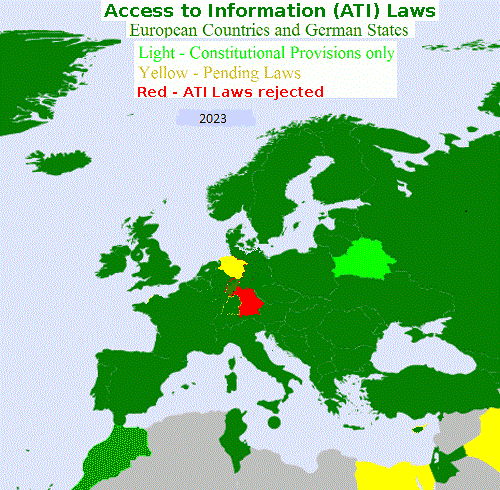
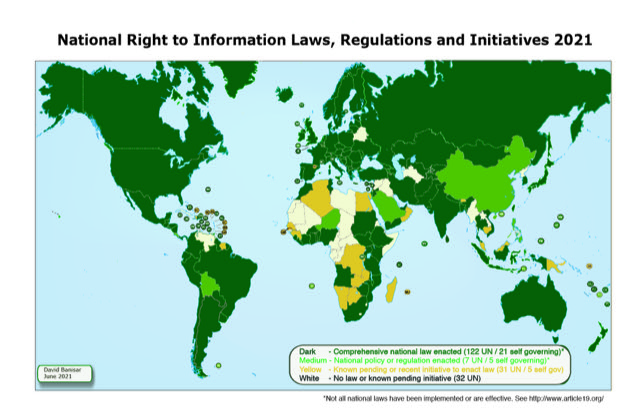
159 States ratified the UN Convention against Corruption:
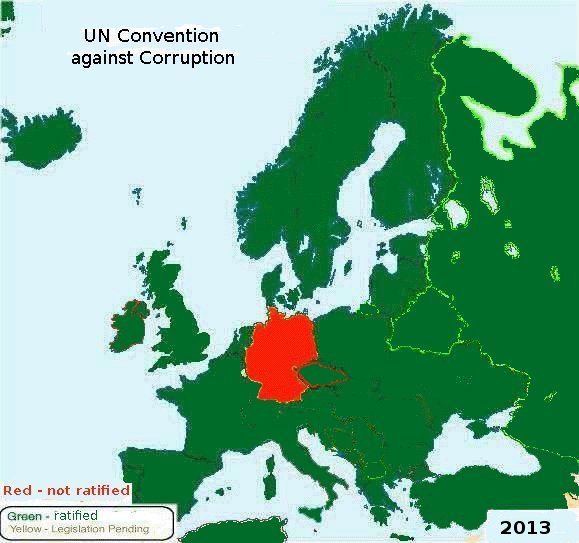
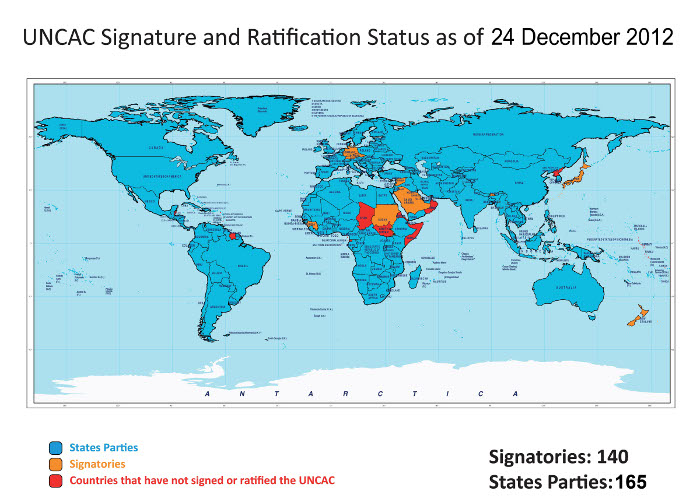
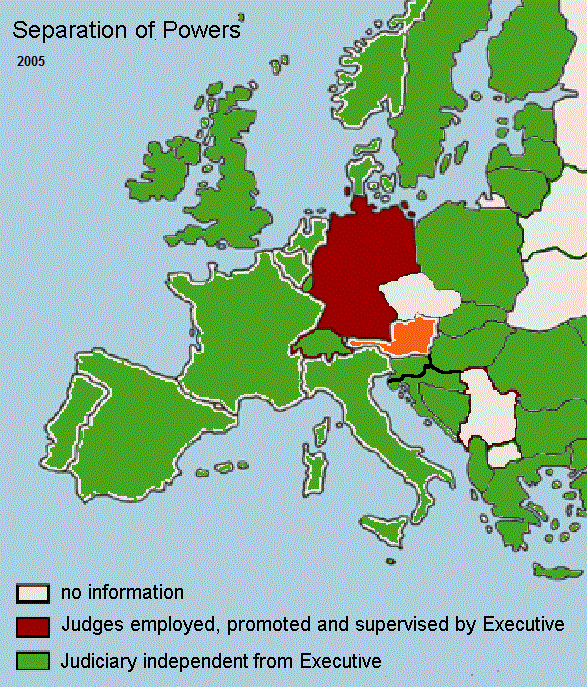

 in
German on same subject: http://wkeim.bplaced.net/files/if-dimr-pbt.htm
in
German on same subject: http://wkeim.bplaced.net/files/if-dimr-pbt.htm